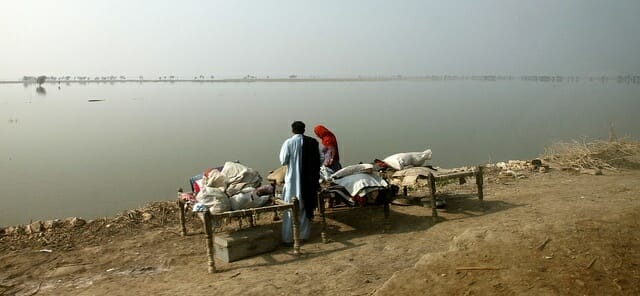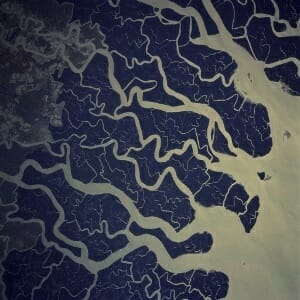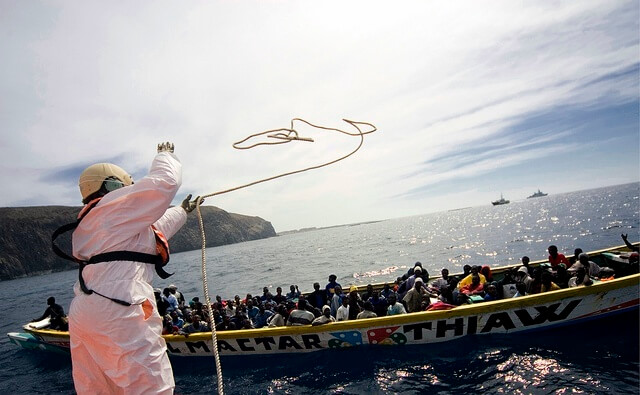Guest post by Alex Randall
I’ve spent the past year gathering testimonies from people who have moved due to the impacts of climate change. These stories reveal there is something deeply wrong with the way some green groups talk about migration.
It has become a mantra among green groups that climate change will create unprecedented migration. Possibly from developing countries to the UK. In an attempt to win over the climate sceptic Right, some green groups have adopted a worrying anti immigrant stance. In an attempt to convince the public that climate change requires urgent action, they warn that mass migration out of impacted areas will force millions of people into the UK. But more worryingly they argue that the impact of this imagined migration will be negative. In fact, freer movement will be a key way that some people survive climate change.
Most of the testimonies that I looked at were from people who had moved during sudden climate linked disasters. These two quotes from people fleeing disasters in Philippines are typical of many I looked through.
“I lost one of my grandchildren and my younger sister. Early the next morning, rescue workers came with boats and they took us to an evacuation centre.”

“We were trapped in the house for two days until someone came and rescued us in a boat, and we were taken to the local gymnasium which was being used as an evacuation centre. We stayed there for a week but it was so crowded that we decided to leave and go back to the ruins of our house.”
Rosalie Ticala, 33, Philippines, Mindanao Island

What is clear from these testimonies is that during sudden disasters people move a short distance. People often move to the nearest place of safety, to stay with friends or family near by, or are evacuated. People in this situation rarely cross borders, let alone continents. Usually people affected in this way want to return to their communities and take part in reconstruction. The idea that these kinds of disasters are going to create mass migration to the UK is not supported by any evidence.
Slowly unfolding disasters like drought create different kinds of human movement. As these impacts degrade livelihoods people seek work elsewhere. But communities will not move en masse. In fact families will often not move together. People will likely move seasonally and temporarily in response to changing weather patterns. This testimony from a farmer in Mexico is an example of this kind of migration.
“Times have changed … the rain is coming later now, so we produce less. The only solution is to go away, at least for a while. Each year I’m working for three to five months in Wyoming. That’s my main source of income.”
Miguel, 45, Hueyotlipan, Mexico
For many people migration becomes a way of adapting to climate change. The ability to migrate becomes a vital way for people to protect themselves against the impacts of climate change. But in the testimonies I read there were mixed feelings about using this kind of migration as a form of climate adaptation. Some people clearly grasped the risks of moving.
“Rains recently have been very intense… Without comparison, like nothing before … We’ve never seen this before. We don’t want to leave our land: here are our past, our memories, our ancestors. We don’t want to move to other parts, we don’t know what to do there. We would turn into delinquents. We’d enter into a cycle of poverty which happens in the cities.”
Octavio Rodriguez, Sucre, Colombia
The testimonies and evidence point to short distance movement. When people do cross borders they tend to be into neighbouring countries, not across continents.
However the right to move and cross a border safely and legally should be there if people need it. In a world disrupted by climate change, the ability to move will be a matter of life and death for some people. We don’t have to look far to see the tragic effect of trying to restrict free movement. This year the Mediterranean has swallowed the lives of 3000 migrants trying to make the crossing into the EU. It has become the most dangerous border crossing in the world. The staggering number of deaths is because people are not allowed to make this crossing safely and legally. Our closed borders and immigration controls force people into the hands of traffickers, onto unsafe boats, and then into the sea.

Perhaps the most damaging and inaccurate claim is that this kind of migration will create new armed conflicts, and that this new security crisis that will require a military response from developed countries. There is almost no evidence that migrants cause armed conflict. In spite of this, it has become a mainstay of the climate-concerned as a way of galvanising political action on climate change. Lord Stern (of the Stern review) has repeatedly claimed that new flows of “climate refugees” will result in new wars. He told the Guardian “Hundreds of millions of people, perhaps billions of people would have to move, .. If we’ve learned anything from history that means severe and extended conflict.”
In repeating this claim Stern has overlooked a huge body of evidence. The evidence suggests the link between climate change and conflict is far from simple. There is little evidence linking climate change to international warfare. There is mixed evidence linking climate change with civil conflict. But no evidence to suggest that the migration of people is a cause of this violence. Worryingly, Stern has scapegoated a vulnerable group of people and suggested that they will be a catalyst in violence.
This is the same rhetorical flip that the anti-migrant greens have made. They have swapped the positions of perpetrators and victims. Suddenly the high emitting countries become the “victims” as migrants disrupt their societies. And the people most affected by climate change become the perpetrators of conflict and disruption.
This is an intellectual deceit of the worst kind.
Alex Randall runs the Climate Change and Migration Coalition. The network is a group of refugee and migration groups working to support and protect people at risk of displacement linked to environmental change. The project is run by COIN.